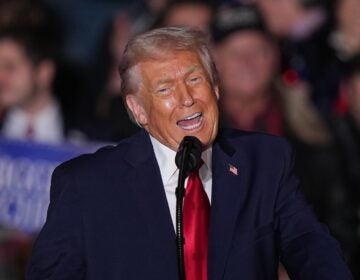Trump’s influence over GOP faces fresh tests in 2022 primaries
Trump's preferred Senate candidate in Pennsylvania, Mehmet Oz, has divided conservatives who are typically in lockstep with Trump.

Mehmet Oz, a Republican candidate for U.S. Senate in Pennsylvania, meets with an attendee during a visits to a car show in Carlisle, Pa., Saturday, May 14, 2022. (AP Photo/Matt Rourke)
Former President Donald Trump on Tuesday faces the strongest test yet of his ability to shape a new generation of Republicans as voters in Pennsylvania and North Carolina decide whether to rally around his hand-picked choices for critical U.S. Senate seats.
As this year’s midterm primary season enters its busiest stretch with races also unfolding in Kentucky, Oregon and Idaho, Trump is poised to notch several easy wins. In North Carolina, U.S. Rep. Ted Budd is expected to best a packed field of GOP rivals, including a former governor. And in Pennsylvania’s GOP race for governor, far-right contender Doug Mastriano was already leading before Trump backed him over the weekend.
But Trump’s preferred Senate candidate in Pennsylvania, Mehmet Oz, has divided conservatives who are typically in lockstep with Trump. Some are suspicious of the ideological leanings of the celebrity heart surgeon who gained fame as a frequent guest on Oprah Winfrey’s talk show. Oz has spent much of the campaign in a heated fight with former hedge fund CEO David McCormick. That’s allowed commentator Kathy Barnette to emerge in the final days of the primary as a conservative alternative to both Oz and McCormick.
Trump, who has held campaign-style rallies with Oz, insists he is the best candidate to keep the Senate seat in Republican hands in the fall. Given his level of involvement in the race, a loss would be a notable setback for the former president, who is wielding endorsements as a way to prove his dominance over the GOP ahead of a potential 2024 presidential run.
“I think he’s tough. He’s very smart. He’ll be helpful,” Trump told a Philadelphia radio station on Tuesday, referring to Oz. I also think he’s the one that’s gonna win the election. You know that’s not an easy election to win.”
Democrats, meanwhile, have their own high-profile primaries. In Pennsylvania, progressive Lt. Gov. John Fetterman has dominated the Senate race but was forced off the campaign trail by a stroke. The 52-year-old Fetterman remains hospitalized, though he said he is expected to make a full recovery.
In North Carolina, Cheri Beasley is the clear front-runner in her 11-candidate primary for the Democratic Senate nomination. If she prevails in November, Beasley would be the state’s first Black senator — and just the third African American woman ever elected to the chamber.
Tuesday’s contests could ultimately determine how competitive the general election will be this fall, when control of Congress, governor’s mansions and key elections posts are up for grabs. That’s especially true in the perennial political battleground of Pennsylvania, where some Republicans are already worried that Mastriano is too extreme to woo moderates who are often decisive in general elections.
“There’s definitely some concern in large factions of the party,” said Pennsylvania Republican strategist Vince Galko. “Especially those in the suburban areas.”
More fundamentally, Tuesday’s primaries could test voters’ commitment to democratic principles. Barnette is running even further to the right than Oz and participated in the January 2021 rally that turned into an insurrection at the U.S. Capitol.
Then there’s Mastriano, who was also outside the Capitol during the mob attack and would appoint Pennsylvania’s chief elections official if he becomes governor. He has pledged to take the extraordinary step of requiring voters to “re-register” to vote — even though that’s barred by the National Voter Registration Act and likely violates significant protections under federal, and possibly state, law.
“We’re going to start all over again,” Mastriano, who has barred reporters from his campaign events, said at a recent debate.
He’s made Trump’s lies about widespread electoral fraud costing him the presidency a centerpiece of his campaign — and has been subpoenaed by the House committee investigating the Capitol riot following his efforts to name a slate of alternate Electoral College electors in Trump’s favor.
Trump’s safest bet on Tuesday might be Budd, who has overcome a slow start to emerge from 14 Republican primary candidates, including former Gov. Pat McCroy, as a favorite in North Carolina’s Republican Senate primary.
“Trump is the most important factor,” said David McLennan, a political science professor at Meredith College in the state capital of Raleigh, who also noted that another conservative group, anti-tax Club for Growth Action, has paid for pro-Budd advertising. “Trump’s endorsement turned the tide for him.”
While much of the attention during the opening phase of the primary season has focused on Trump’s grip on the GOP, the contests also serve as a referendum on Biden’s leadership of the Democratic Party. In the president’s native state of Pennsylvania, U.S. Rep. Conor Lamb, a moderate in the mold of Biden, is at risk of being trounced by Fetterman.
Lamb said Tuesday he had detected “frustration” among Democratic primary voters, a feeling he said he shared as the party has struggled to accomplish much of its policy agenda. But he argued that moderates helped Democrats retake control of the House in 2018 and that the party should “double down” on that approach this year.
“What I’ve been trying to do throughout this campaign is talk about the fact that no matter how difficult it is, we actually know as a party what it takes to be successful,” Lamb told a Pittsburgh radio station. “I saw us pull off something that many people said was impossible.”
Still, known for his hulking, 6-foot-8 stature and tattoos, and for championing causes including universal health care, Fetterman has appealed to many Democrats with an outsider image — and that could hold despite his health scare.
Pat Sweeney, a 59-year-old from Hamburg, Pennsylvania, said he voted for Fetterman because “he seemed like a decent guy and knows what he’s doing.”
Another race testing Biden’s national appeal with Democratic primary voters comes across the country in Oregon. That’s where the president used his first endorsement of the midterm season to back incumbent Democratic Rep. Kurt Schrader against progressive challenger Jamie McLeod-Skinner.
But Trump’s influence on GOP primaries stretches far wider.
In Idaho, Trump-endorsed Lt. Gov. Janice McGeachin is attempting to unseat Republican Gov. Brad Little. McGeachin issued executive orders banning mask mandates during the height of the pandemic when Little was out of state.
The former president’s support may also swing U.S. Rep. Madison Cawthorn’s race to keep his seat from North Carolina despite recent blunders, and political novice Bo Hines’ efforts to win the House nomination for a seat representing a district covering parts of Raleigh and points south.
Tuesday even features a Kentucky lawmaker seeking reelection who benefitted from a Trump reversal. The former president is now praising as a “first-rate Defender of the Constitution” Republican U.S. Rep. Thomas Massie — just two years after he suggested the Republican should be removed from the GOP for opposing $2 trillion in COVID-19 relief funding.
___
Associated Press writer Michael Rubinkam contributed from Hamburg, Pennsylvania.
WHYY is your source for fact-based, in-depth journalism and information. As a nonprofit organization, we rely on financial support from readers like you. Please give today.






